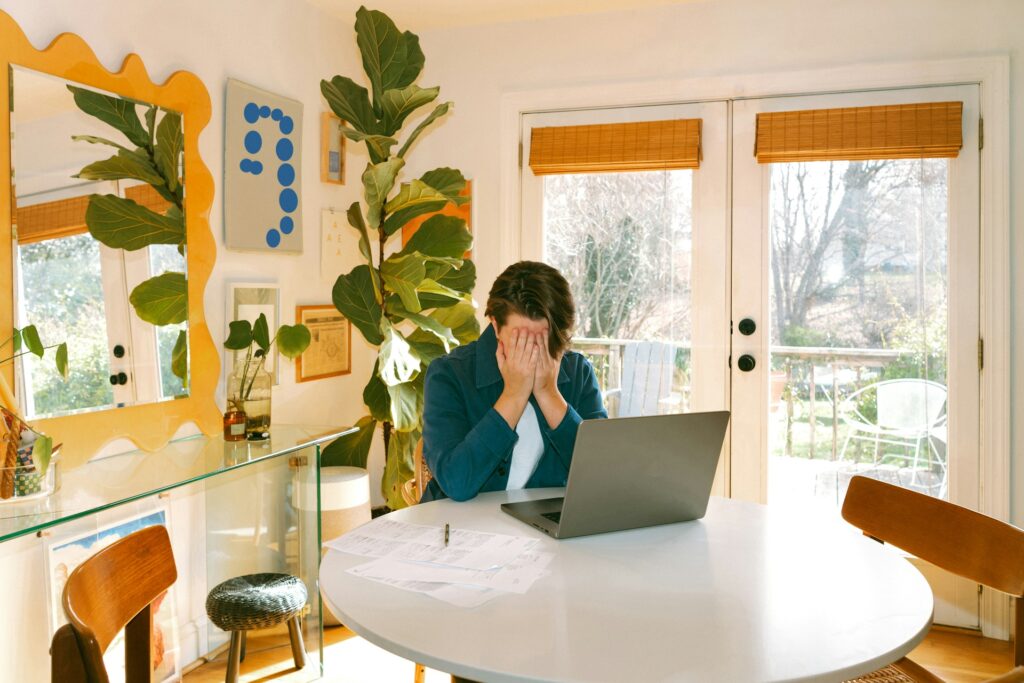When everything starts feeling too loud, too bright, or just too much, it can be hard to explain what’s going on.

That’s especially true if you don’t want to come off as rude or dramatic. However, needing time alone when you’re overstimulated isn’t something to feel guilty about. It’s part of taking care of your nervous system. Whether it’s because of social noise, sensory overload, or emotional fatigue, having a few calm, honest phrases ready can make those exits feel less awkward and more like what they are—just you honouring what you need. Here are some things you can say when you’re at your limit and need some space to reset.
1. “I’m hitting my limit and just need a bit of quiet.”

This one’s calm but clear. You’re not blaming anyone or creating drama—you’re just letting people know you’re at capacity. It works well when you’re around people who care, but might not realise you’re overstimulated until you speak up. Even saying this once helps set a tone that your boundaries are valid, and that alone time isn’t about rejecting anyone—it’s about protecting your own peace for a bit.
2. “I need to step away and just catch my breath.”

This is a kind way to excuse yourself without overexplaining. It makes room for you to pause, breathe, and gather your thoughts without needing to justify what you’re feeling. Sometimes overstimulation sneaks up slowly, and you just need to get to a quieter place. Saying this helps make the exit feel normal, not abrupt.
3. “I’m feeling a bit overloaded, so I’m going to take a break.”

Calling it what it is—overload—can be surprisingly freeing. You’re not saying you’re unwell or upset, just that your brain’s hit capacity. That distinction helps other people understand it’s a sensory thing, not a mood swing. Taking a break can mean whatever you need it to—five minutes outside, headphones in, or a full retreat to your own space.
4. “I’m still listening, I just need some space while I do.”

When you don’t want to fully disengage, but you can’t handle the intensity of being right in the middle of everything, this phrase helps. It lets people know you’re still present, just in a softer way. It works well when you’re in a conversation but starting to feel the strain. You don’t need to disappear—you just need some breathing room.
5. “I’m going to take a moment to reset—back in a bit.”

This is one of those things that makes stepping away feel less awkward. It’s short, respectful, and communicates that you’ll be back, you just need to recalibrate first. It’s especially useful in work or group settings where disappearing without saying anything might feel off, but you still need to protect your energy.
6. “It’s getting a little loud for me—I’m going to step out for a while.”

If sound is a big trigger for you, naming it directly can be helpful. You’re not complaining—you’re just tuning into what your body needs and doing something about it. Most people won’t take it personally, and those who do probably need to hear it anyway. Protecting your ears and your sanity is never selfish.
7. “I’m feeling a bit off and some alone time will help.”

You don’t have to be specific about what feels “off.” Just naming that something isn’t quite right opens the door to space without needing to unpack everything in the moment. This line works when your nervous system is fried and words are hard but you still want to show up with honesty and care.
8. “I’d love to keep talking later, I just need a little time right now.”

Sometimes overstimulation happens mid-conversation. Instead of ghosting, this phrase gently puts a pin in things and tells the other person that you’re not brushing them off—you’re just pausing for your own wellbeing. It shows that the connection matters, and it also shows you’re not available for endless engagement when you’re running on empty.
9. “I’m out of social battery and just need some time to recharge.”

This one’s popular for a reason—it’s relatable. Most people understand what it means to feel socially drained, and this phrase puts it in casual, non-judgemental terms. It’s especially useful with friends or partners who might be extroverted and not notice when your internal battery has already hit zero.
10. “This is all just a bit much for me—I’m going to step away for a bit.”

When you’re overstimulated, everything starts to feel like it’s coming at you too fast. Saying it’s “a bit much” is a softer way to acknowledge your threshold without sounding like you’re overwhelmed beyond repair. It makes your boundary feel more like a reset than an emergency, which is often exactly what you need in that moment.
11. “I’m really grateful to be here, but I need to take a breather.”

This one works well in group situations where you don’t want to seem ungrateful or detached. You’re showing appreciation and still claiming the space you need. It reassures people that you value their company—it’s just that your body is asking for a minute, and you’re choosing to listen to it.
12. “Can we pause this for a moment? I just need to decompress.”

Whether it’s a deep conversation or just too much background noise, asking for a pause is totally fair. Decompression is how you prevent things from spiralling. This one gives you room to breathe without shutting the door completely. It’s not the end of the chat—it’s just an intermission.
13. “I promise I’m okay—I just need a bit of space to recalibrate.”

Sometimes people worry when you suddenly go quiet or leave a room. This helps let them know you’re fine, you’re just managing your own internal weather. It removes the pressure for anyone else to fix it, and reminds both you and them that space is a healthy thing, not a crisis response.
14. “I need to be alone for a while—I’ll check in when I’m feeling more balanced.”

This one’s helpful when you need more than a five-minute breather. Maybe you’re at the edge of shutdown and need actual time away from people to feel grounded again. It sets a clear boundary and a soft plan for reconnection—no pressure, no hard timeline, just an understanding that you’ll be back when you’ve found your footing.
15. “I’m overstimulated and just need a few minutes of quiet.”

Straight to the point but still kind. Saying the word overstimulated out loud can help normalise it, especially if you’re neurodivergent or often misunderstood in social spaces. Sometimes calling it by name is the best way to take control of the moment without letting it spiral into guilt or shutdown.
16. “I really want to stay connected, I just need to do it from a distance for a bit.”

This line is great when you still care deeply about the person or space, but your body just can’t handle full engagement anymore. It reassures them it’s not personal—it’s physical or mental bandwidth. Love and connection don’t always have to be loud, immediate, or face-to-face. Sometimes caring looks like honouring your capacity so you can show up better later.
17. “I’m going to duck out quietly for a bit—it’s just one of those days.”

If you’re not up for deep explanations, this phrase works beautifully. It’s soft, non-confrontational, and totally honest. You’re not pretending you’re okay, but you’re also not putting a spotlight on yourself. It’s the kind of exit that lets you drift out gracefully and take care of yourself without fuss.
18. “I love you, I just really need to be alone right now.”

For partners, close friends, or family, it’s important to say the care part first. This one holds both truths at once—you care deeply, and you also need space. They’re not in conflict. It helps the people closest to you understand that needing time alone isn’t about pushing them away—it’s about pulling yourself back together.
19. “My brain’s a bit scrambled—I need to be somewhere quieter.”

This one brings a bit of humour into it, which can soften the tension. Scrambled brain is something most people relate to, and saying it out loud can ease some of the pressure you might be feeling. You’re being clear about what’s happening without making it heavy. Plus, you’re giving yourself full permission to find somewhere more peaceful to reset.
20. “I just need a little time to come back to myself.”

Because that’s really what it’s about. When everything feels too much, you start to disconnect—not from other people, but from your own centre. As it turns out, time alone is often the only way back to yourself. This one is gentle, grounding, and deeply true. You’re not disappearing. You’re not withdrawing out of anger or moodiness. You’re just making space to feel whole again.


